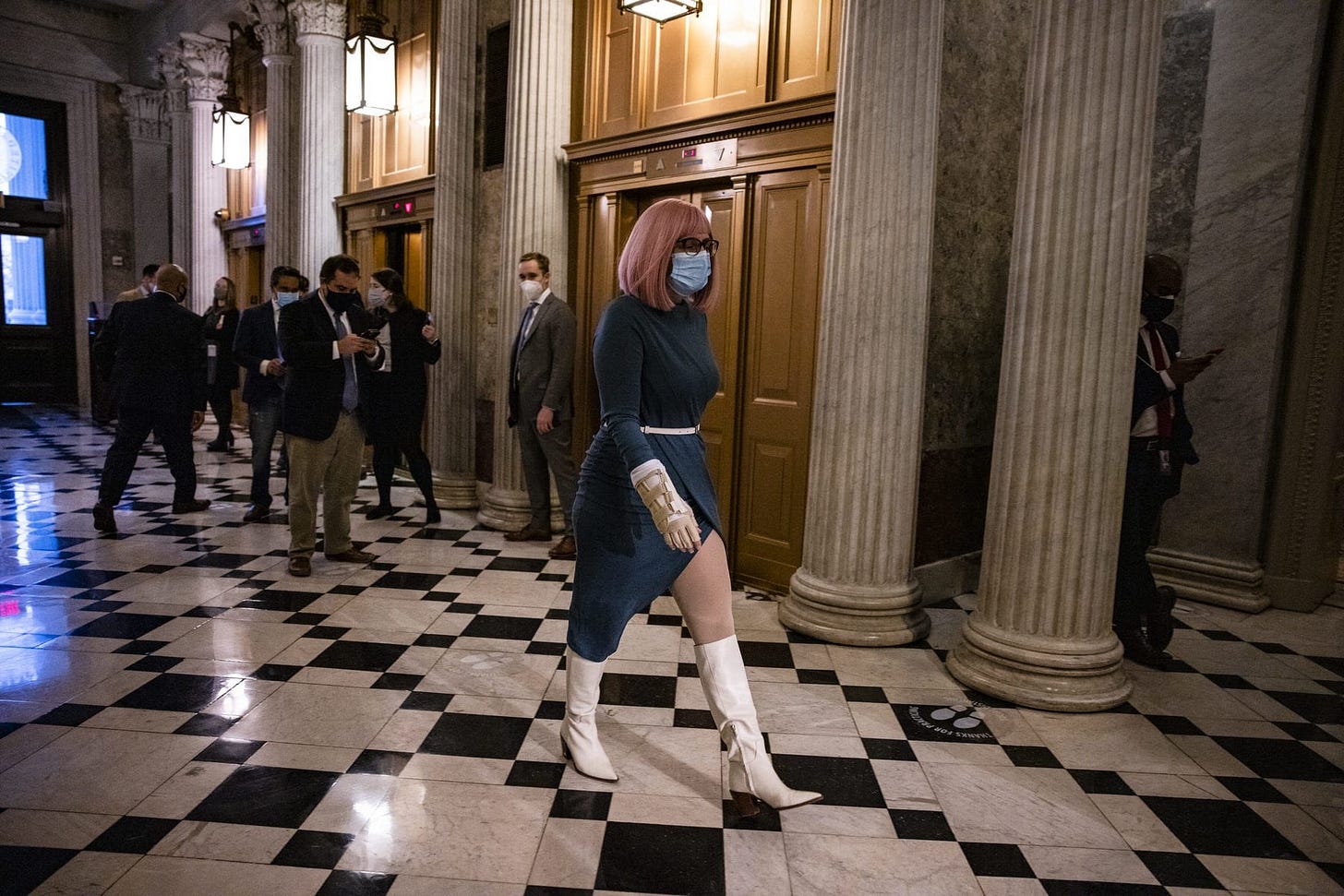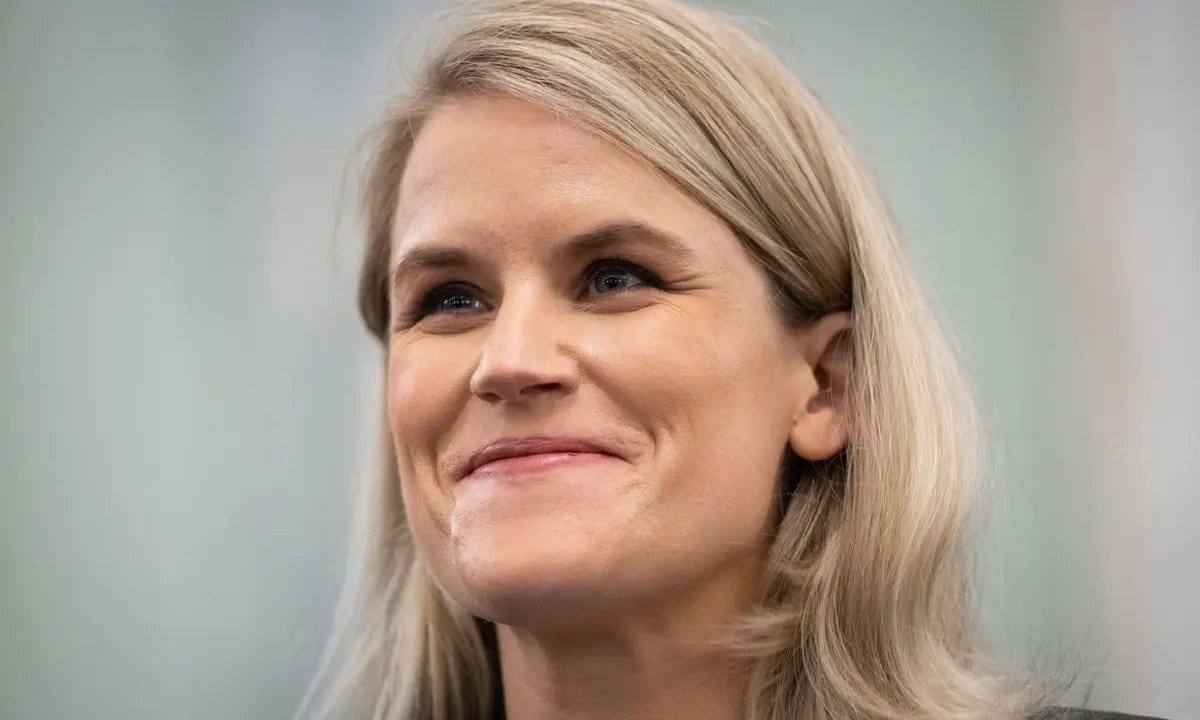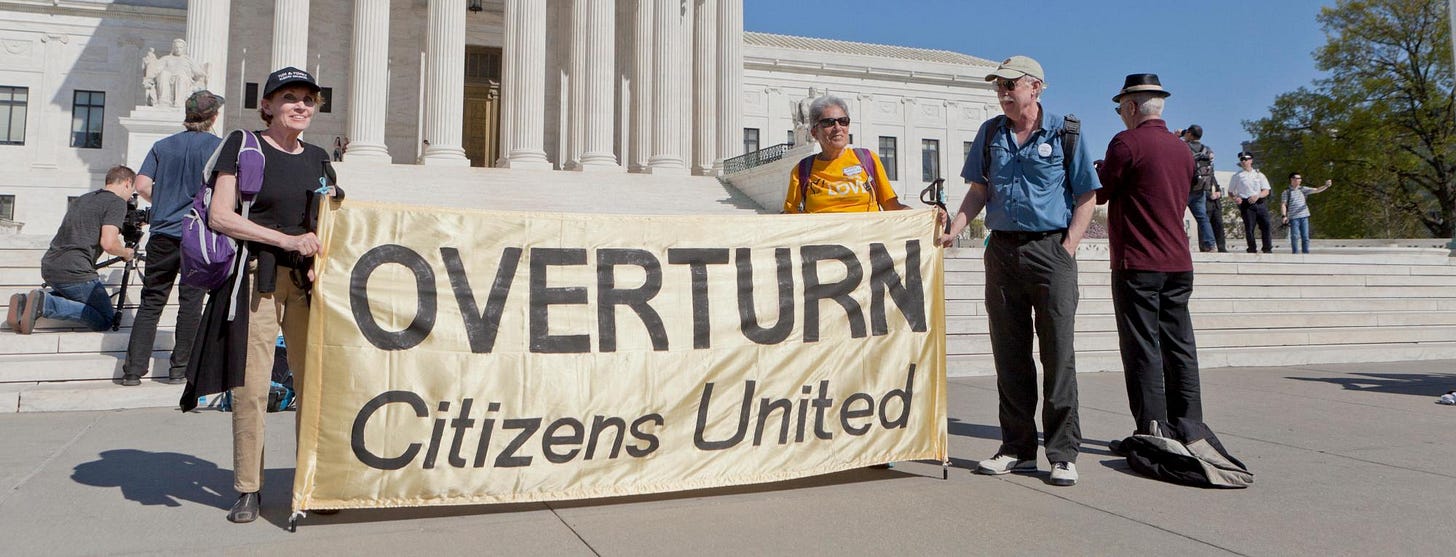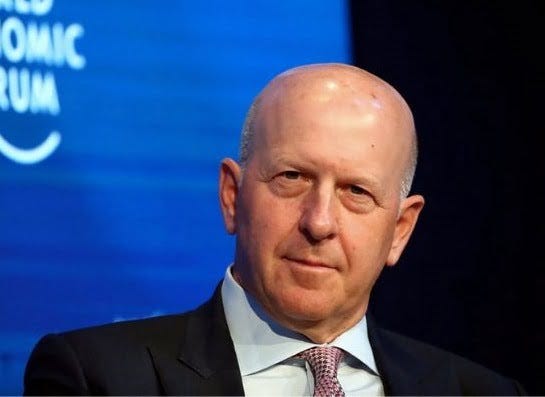5 Ideas For Making the United States a Better Place
Let's stop talking about what we don't want and start talking about what we do
With its brutishly short, sunless days and endless weeks of rain, January is the perfect month (and mirror) for the mental landscapes of brooding overthinkers like me. We peer outside at those slate-gray skies. We fret. We grouse. We make endless cups of hot bitter tea. And we reflect on all the things that are wrong with the world, things we have no chance of fixing, things that laugh at us because we are delusional enough to care.
These ruminations have a very specific choreography. They start with what’s wrong with the world and end with what’s wrong with me: to wit, what a thankless, pointless enterprise writing is, how no one reads anymore, how the entire world watches TikTok videos now, how ChatGPT can do what I do only with far less effort, how long it’s been since I’ve had a decent-paying job, if my kids are telling the truth when they say they’re okay, how many years it’s been since I’ve seen a dermatologist, what is that—a freckle or a mole, did John remember his keys, and if Putin launches a nuclear bomb, how long before it gets here?
After that bile drains down the back of my throat for a while, I usually burrow in a little deeper: how stupid am I for worrying about things I can’t control? The past is gone, and the future hasn’t happened yet. All that worrying about the past or the future manages to do is rob me of the potential joy of the present moment.
That, at least, is what Presence Gurus like Eckhardt Tolle would have you believe, and he’s not wrong. But we are fools to think that happiness is entirely an inside job.
Just ask Ukraine.
Maslow’s hierarchy of needs (Maslow believed that so long as basic needs for survival were met, such as food, water, shelter, higher-level needs like self-actualizing would begin to motivate behavior, which explains the entirety of the Italian Renaissance.) show that externals are just as important. And that got me thinking about what external conditions we as a country (the U.S., in this instance) need to put into place before we can truly prosper.
I also realized that writers spend an awful lot of time moaning about the evils of the world without always offering … well, if not solutions, at least ideas. We need ideas.
Holding as self-evident this one truth, that every road to hell is paved with good intentions and that all ideas are theoretical until they are put to the test in the real world, I would like to offer some ideas. And I’m hoping they will inspire you to come up with even better ones.
Do remember, however: human nature is human nature. We must always take that into account. My beef with the invisible-hand-of-the-free-market zealots and tech-utopians, for instance, is their willful blindness to human nature, their own and everyone else’s. Fully accepting that people are inherently greedy, greed flourishes when there’s no oversight and accountability, we are only as good as have to be, and everything we do, when you come right down to it, is a competition for sexual partners will help us understand the limits of these and other ideas.
Despite what Marjorie Taylor Green might tell you, oversight and regulation, when properly implemented, are necessary guardrails. Without them, we are Russia.
So, with that in mind, here are five ideas for making the United States—and perhaps the world—a better place.
Financial Transparency and/or Fair Taxation of Churches
The faith economy is the 15th largest national economy in the world—$1.2 trillion annually, on average. Any organization in the U.S. that bills itself as a church is not required to disclose financial information, not to you, not to the IRS. That’s because churches, synagogues, and mosques are, by definition, nonprofit, and nonprofits can’t be taxed on their net income. Why? Theoretically, they don’t have a net income, merely contributions.
In reality, that’s a lot of malarky. The Catholic Church owns 177 million acres of land across the globe, land that is used to build churches and schools, but also farmland and forests. Those aren’t contributions; they’re revenue.
For the record, tech mogul Bill Gates owns about 270,000 acres of U.S. farmland. Fast-food franchise McDonald’s owns about 70% of its franchise buildings and 45% of the land they are built on. Calculations show that McDonald’s owns around 47,037 acres of land, which is why its real profits stem from acting as a landlord to its many franchisees. It’s a business model that has worked for them in the past; whether it continues to do so in the future remains to be seen.
But what if we demanded financial transparency from religious institutions—or financial transparency in exchange for continuing tax-free status? We’d know exactly whose finger is in each political pie. More than a few churches contribute millions of dollars to rightwing political causes and candidates. They fund gun legislation. They throw millions at fake abortion clinics that lure in desperate women under false pretenses and then shame them into carrying until term. We need transparency. We need to know when war is being waged behind our backs. And we need tax dollars to fund our schools, healthcare, and infrastructure. America is only great when we make her the priority; not the profit margin of some filthy rich CEOs.
All Social Media Platforms Must Use Open-Source Algorithms
“I’m here today because I believe Facebook’s products harm children, stoke division, and weaken our democracy,” Frances Haugen, a former product manager at Meta (Facebook) said during her Senate testimony in October 2021. “These problems are solvable. A safer, free-speech respecting, more enjoyable social media is possible. But there is one thing that I hope everyone takes away from these disclosures, it is that Facebook can change, but is clearly not going to do so on its own.”
Her most urgent recommendation? Transparent and open-source algorithms. During her testimony, Haugen repeatedly came back to the idea that Facebook’s algorithm incites misinformation, hate speech, and ethnic violence.
So, what is an algorithm? In computer science, an algorithm is a set of instructions that are typically used to solve a specific problem. Facebook uses them to target ads and rank content (i.e., your posts) based on decisions made by hundreds, perhaps thousands, of algorithms.
The problem is, no one, not even Facebook, understands them. AI (Artificial Intelligence) is doing all the heavy lifting. Lacking a human soul or any kind of moral compass makes this method of doing business rather terrifying.
If social media were forced to use open-source algorithms, there is less likelihood of young Jordan Peterson followers, say, being fed an additional diet of Nick Fuentes and Incel videos on platforms like YouTube. It would be harder to radicalize young Muslims. The algorithm makes no judgments about the things a person watches; it merely delivers more of the same. And that’s part of the problem. We don’t usually realize just how far the rabbit hole we are until we start shooting up a playground.
Overturn Citizens United
Every time you see the words “Citizens United,” what should immediately come to mind is “dark money.” That’s what Citizens United is: a safe, anonymous conduit for dark money, especially from corporations.
Not only did the infamous 2010 Supreme Court ruling in Citizens United v. FEC strip the government of its authority to limit the amount of spending on elections, more recently, an even more radicalized Supreme Court doubled down on that ruling by giving wealthy donors more latitude to shape American politics in secret.
With the Court rewriting legal standards governing disclosure laws, we now have almost no transparency when it comes to dark money in politics. It’s how Trump got elected. It’s how the Koch Brothers kept plunging their huge proboscises and other extensible tubular sucking organs into the very nectar of American politics.
Democracy is transparency. Strange, isn’t it, how every item on my wish list so far has to do with purposely eroded transparency.
The Closure of All Tax Loopholes & the Elimination of Offshore Tax Shelters
Will you look at that? We’re back to transparency again.
Democrats are terrible at getting the word out about their legislative victories, which is a shame since the Inflation Reduction Act is a big one. A lot of amazing things are packed inside that birthday present to America. For example, a new 15% corporate tax rate.
In 2019, 20% of large corporations earning more than $100 million in profits paid zero in federal income taxes. Some actually received tax refunds. This 15% tax minimum will generate billions of dollars the country needs in order to fix what’s wrong with it, which is plenty.
The most galling of tax loopholes is, of course, the carried interest tax, a loophole that benefits the 1% of the 1%, namely partners in private equity firms and hedge funds. Their share of their clients’ profits would normally be taxed at 37%, which is fair. Thanks to Senator Kyrsten Sinema of Arizona, who killed all attempts to close it, those one-percenters are now taxed at the much lower 20% capital gains rate. Closing the loophole would have generated about $14 billion in additional tax revenue.
Thanks, Senator Sinema. You’re a peach.

The U.S. loses about $441 billion in tax evasion every year, much of that from the wealthiest 15%. Do you know who pays the price for that? We do. Inadequate schools, inadequate roads and bridges, inadequate job training, inadequate healthcare services for the underprivileged. You know—Americans.
Stop Putting Goldman Sachs Operatives in Charge of Reducing Our Carbon Emissions
For the same reasons educators ought to be in charge of education, and politicians ought to be in charge of politics, Goldman Sachs and other representatives of “the free market” should have zero say in how we save ourselves from extinction. Zero. Because as things stand right now, a whole bunch of those Wall Streeters are not only calling the tune, they’ve bought the fiddler.
Its name is cap and trade.
Cap and trade is a global stock market meant to reduce emissions while at the same time making a handsome, pocketable profit.
Oh, not you. You’ll actually pay more at the gas pump. No, I mean Goldman Sachs.
The “cap” in cap and trade refers to the intended reduction of carbon emissions. Every year, governments dial out a finite number of “pollution permits” to corporations and multi-conglomerates in their respective countries. Every year, the number of permits becomes smaller and smaller. Eventually, or so the theory goes, we not only reach zero emissions, we reach it on the same timetable.
Rich corporations have the research and development dollars to create green options, which means they can afford to hang on to their pollution permits. These permits increase in value as fewer of them become available. The “trade” part of cap and trade comes when these corporations sell their permits to companies that aren’t as far along in the process of reducing their emissions. The thinking is, as long as we stay under the cap, what does it matter who pollutes?
As it turns out, it does matter who pollutes. The biggest companies and the biggest polluters receive the lion’s share of permits for free. In fact, the more they’ve been polluting, the more permits they get. All they do is turn around and sell them for billions in extra profits.
In Europe, cap and trade was an abysmal failure. Not only did consumers pay more at the pump, carbon emissions actually went up. In the U.S., cap and trade is active on the eastern seaboard, but I promise you that’s not going to end well.
So, no more Dunning-Kruger victims. From here on out, it’s experts being allowed to expert, and everybody else shutting the hell up about it.
Public Schools Must Be Based on the Finnish Model
American schools are failing hard, but they’re failing for preventable reasons.
Schools are woefully underfunded, run by business people and politicians instead of educators, children are taught to pass tests (the purveyors of which have an actual lobby on Capitol Hill) instead of how to think critically and to learn. American classrooms are structured improperly. They’re about rankings, comparisons, and competition instead of cooperation. The teachers are hamstrung by policy, there are too many students per classroom, and recess is begrudgingly given instead of built into a regular school day. Kids with learning disabilities or who are neuro-divergent are shuffled off to separate classrooms instead of being allowed to stay with their peers and given one-on-one help by highly qualified specialists.
We’re clearly doing school wrong because Finland consistently comes out on top in science, math, and reading, while we rank somewhere in the middle, and that includes test results from private schools.
Thanks to radical innovative thinking and a willingness to throw out the old 19th century playbook, Finland is enjoying a staggering amount of success. Their educators are selected from the top 10 percent, required to earn at least a master’s degree in education. Children are not given any standardized testing until their senior year. They are assigned very little homework. Each school, even those drawing from a non-Finnish, disadvantaged demographic, has the same goals and resources, which is why every child in Finland has a shot at a quality education no matter where he or she comes from. Despite paying their teachers a competitive salary, Finland spends about 30 percent less per student than the United States.
So, yeah. We need to let educators educate. We need to let them make executive decisions that benefit their students, not the highly politicized agenda of the school board. We need more federal funds, not privatized school vouchers. And we need to understand that no one—including adults—can sit at a tiny desk for eight hours a day five days a week without requiring heavy sedation. Which is pretty much what we’re doing to our poor children.
We can do this. We have to do this. America’s greatest quality is her ability and willingness to innovate. With greater transparency and a wider separation between business and climate and business and education, we could really make some things happen.
The needs of the many outweigh the needs of the few. The problem is we’ve forgotten that.
Do you have ideas? I LOVE ideas! I wanna hear them. Be sure to leave your comments in the comments section below.









It has been a while since I had a chance to talk with my friend and colleague Jim Garrison (he wouldn't mind my naming him in public; he considers himself a public intellectual and besides, he's basically not on social media) who is the person on top of this and my source of information, but many of these education comparisons from the past have failed to compare like-with-like. When looking at educational results from Europe and Japan, for example, we only see *the top 40% who are slated to go to university*. Meanwhile, results from the US are taken from 100% of persons in high school. When properly normed, those disparities shrunk, and in some analyses vanished. But again, my information here is over a decade old.
Another 'by the bye' -- part of the Out-Of-Control (OOC) nature of AI is precisely that it is *NOT* all algorithms. Contemporary AI also employs "heuristic" programming. This is where the AI has various types of feedback systems that allow it to "learn" *and modify its own code*! An algorithm is always fixed. Consequently, after these things have been running for a while, no one anywhere has any idea what the code now looks like. (Fun fact: Arthur C. Clarke, in naming the computer in '2001: A Space Odyssey', chose HAL because they are each the preceding letter to IBM. But then he had to make sense of those letters in the story. So he declared that they stand for "Heuristically programmed ALgorithmic computer." Stacey, Stacey, my mind is going, Stacey. I can feel it; I can feel it ... )
Based on the lede, I had guessed at an entirely different sort of wish list from yours. I think yours is more likely to come about in the near term. I guessed Universal Healthcare, Universal basic housing, and Universal Basic Income (UBI).
It is a long-standing complaint of mine that we insist on putting "successful" business people in charge of *economic* issues. That's like having your dentist (who, let us suppose, is a very good dentist) be in charge of neurosurgery, because they both have something to do with the head. I probably know more about basic ECON than just about any famous "business leader" you could name, and it isn't even an area of scholarly focus for me, just a better than average intellectual hobby.
That being said, there actually ARE words -- I'll just not share them here -- for the level of vituperation I am prepared to heap upon business persons being put in charge of educational systems at any level.
"We can do this. We have to do this." And yet, we WON'T do this...because it makes too much sense and some Republican in Congress will stand up and scream, "WE CAN'T AFFORD IT!" Despite this, we'll continue rolling $2 BILLION per day through the front door of the Pentagon for no discernible reason other than defense contractors need to prop up their stock prices.
Sunlight really is the best disinfectant, but cockroaches HATE sunlight, so good luck getting churches and other tax-exempt organization to agree to transparency. They will scream about added costs, which is a smoke screen, but not an altogether unwarranted concern. It will cost more money to be transparent, but considering that taxpayers are currently subsidizing them, I think they can take the hit.
I don't disagree with your proposals- far from it. I just don't think there's the political will, and I think too many American are far too intellectually lazy to give a damn to know enough about these issues. What they care about is that their kids aren't being taught CRT or- like Libs of TikTok- aren't going to Drag Queen Story Hours.
Greetings from our stupid RepubliKKK.
And, yes, it's grey, damp, and dreary here in Portland and I'm in a crap mood.🤷🏻♂️